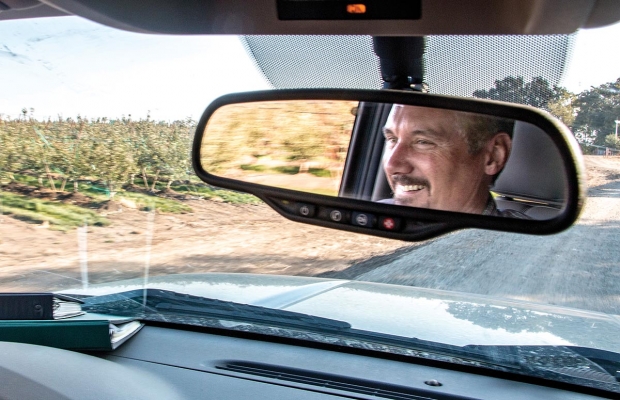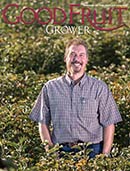
Jeff Colombini is a hands on kind of grower and spends hours monitoring fruit development in orchards managed by Lodi Farming. Many Northwest orchardists have visited his California apple and cherry orchards. TJ Mullinax/Good Fruit Grower
On the diversified farming region of California’s San Joaquin Valley, Jeff Colombini’s innovative and profit-minded approach to tree fruit production stands out. Growers from near and far come to visit the widely admired farm management company that he operates.
At Lodi Farming, Inc., of Lodi, California, visitors will see new technology, sound environmental stewardship, orchard innovations, and an extensive cherry rootstock collection, but they also will spend time with a skilled horticulturist known for welcoming guests and sharing his strategies for successful fruit production.
2013 Grower of the Year
On a visit to Lodi Farming, it doesn’t take long to realize why fellow growers have named Jeff Colombini the 2013 Good Fruit Grower of the Year and will honor him for service to the industry in December at the annual meeting of the Washington State Horticultural Association.
“He selflessly contributes his time to community, state, and national industry issues,” said Jim McFerson, manager of the Washington Tree Fruit Research Commission. “He typifies what the Good Fruit Grower of the Year stands for. Jeff is the kind of grower that should grace the Good Fruit Grower magazine.”
1,800 acres
A grandson of an Italian immigrant who moved to the valley in 1906, Colombini is president of a company, owned by himself and the management team, that farms 1,800 acres of apples, cherries, olives, walnuts, wine grapes, and alfalfa as a tenant farm operator.
Colombini, 50, is a third-generation farmer. He knew in high school that he wanted to be involved in agriculture, but he wasn’t locked on being a farmer.
“I knew I wanted to eventually be in business for myself, preferably in an agricultural business, but it could have been any business,” he said.
“My father always farmed on the side, growing cherries and other crops, while doing another job. He was an insurance salesman, field representative for a cherry packing plant, and did other jobs,” said Colombini. “At one time, my father was part owner and general manger of C & O Packing (Colombini and Oneto), a cherry packing house, but he still farmed on the side.”
More Stories |
| – Grower has an open door |
As Colombini neared college age, his two older brothers were working with his father, farming and operating a cherry packing company called Agri-West.
“I have three brothers (including a twin), and my two older brothers were already working with my father,” he said. “There wasn’t room for me to come back to the family farm, but I knew I wanted to eventually get into some kind of business. It could be related to agriculture, or not. I felt I needed an education in both finance and science, so I majored in agricultural business and fruit science at Cal Poly (California Polytechnic State University, San Luis Obispo) with the goal of someday being in business for myself.”
Bottom line perspective
Colombini gained invaluable insight in the world of agricultural finance during his four-year stint with the Santa Rosa and Ripon branches of Farm Credit, an agricultural lending cooperative.
He then spent three years as an operations analyst for San Tomo, a tomato and fruit canning company owned by Dino Cortopassi, a prominent agricultural businessman of Stockton, California. Cortopassi is also a major landlord of Lodi Farming and Colombini’s business mentor.
While at Farm Credit, Colombini learned a principle that would influence his future farming decisions and success. “One of the things I quickly observed was that the farmers that kept track of their costs and knew how much they were making on each crop by field, block, and variety were the ones that were successful,” he said. “That’s been very valuable in making our planting decisions at Lodi Farming because we’re making decisions that last for 30 years.”
His time in the food processing industry was also valuable. He learned nonagriculture business principles and concepts that have helped him become a better farm manager.
In a state with such diverse geography and climate that’s known for having the lowest (Death Valley) and highest (Mt. Whitney) points of elevation in the country, Colombini can grow just about any crop. His planting and farming decisions are guided by a detailed cost accounting system that tracks inputs of each block and variety.
“Planting decisions are a combination of looking in the rearview mirrorknowing what past costs areand looking forward to where you think trends, markets, and now, labor availability, are headed,” he said.
When Colombini began as farm manager for Lodi Farming in 1992, he succeeded Bill Sheffield who was retiring. At that time, the company was the farming arm for Cortopassi and leased open ground from Italian investors, involved with mostly wine grapes and row crops. Cortopassi wanted to lease his property and not be involved with daily farming decisions, which changed the focus of Lodi Farming.
Since then, Colombini has added additional acreage, both owned and leased, to the Lodi Farming portfolio, and significantly increased apple plantings from 36 to more than 500 acres, making the company one of the largest apple growers in the state.
Apple varieties include Gala, Fuji, Granny Smith, and Pink Lady (Cripps Pink). Of the remaining 1,300 acres under Lodi Farming’s care, 300 acres are cherries (Chelan, Index, Bing, Coral Champagne, and Rainier), 450 acres are olives, 250 acres are walnuts, and the remaining 260 acres are wine grapes and alfalfa.
“The success of Lodi Farming is due to the management team,” Colombini said. Lodi Farming’s management team is comprised of Colombini, who’s primarily responsible for the horticultural side of things; Ray Avansino, vice president and in charge of equipment and operations; and Ezequiel Escamilla, who manages their labor. “Ray and I are equal partners and share in all of the decision making, and Ezequiel does all of the hiring of our full-time and seasonal workers,”
Lodi Farming is owned primarily by Colombini and Avansino, and they are owners in about half of the acreage that the company manages, with the remaining leased through long-term contracts of up to 30 years. Leases for the high-value, perennial crops are farmed under share-cropping agreements, in which the land owner is paid a percentage of the crop revenue after harvesting, packing, and sales charges are deducted.
“Almost all of the land we farm is contiguous, which makes moving equipment and crews much easier than if we were spread all over the county,” Colombini said. Landowners leasing their acreage generally fall into two categoriesretired farmers or their heirs not ready to sell their land and those who want to live in the country on 20 acres but don’t want to be a farmer.
The lease model has worked well for Colombini, who admits that he would never be able to farm such a large amount of land on his ownand do it successfully. “I’d probably be able to only farm about a third of what we’re doing,” he commented.
Popular orchards
Through the years, his orchards have been stops for organized and individual grower groups, from the International Fruit Tree Association to Washington Tree Fruit Research Commission committee members.
In describing his approach to horticulture, Colombini said he works with the tree, instead of against; manages soil and the surrounding environment to keep it healthy for the long term; focuses on the economics of staying profitable; and he strives to produce flavorful, high-quality fruit enjoyed by the consumer.
His experimental cherry rootstock trial, reputed to be one of the more extensive and complete of rootstock trials planted on the West Coast, has been a popular visit for cherry researchers and growers. Washington cherry growers have brought several cherry horticultural gurus from Washington State University to meet with Colombini and learn about common cherry industry problems. Drs. Gregory Lang (now at Michigan State University), Matthew Whiting, and cherry breeder Nnadozie Oraguzie are past visitors.
Colombini began his rootstock trial in 1999 and has around 20 rootstocks. When he planted it, the University of California was no longer doing cherry research, and the California Cherry Advisory Board didn’t want to commit resources to long-term research, he explained. It became noteworthy because it contained more rootstocks and scion combinations in one location than any trial on the West Coast. Rootstocks include selections of Edabriz, Wieroot, Gisela, Krymsk, and several interstem rootstocks developed by Zaiger Genetics.
Future
Colombini and his partners will be deciding in the near future what to plant on 200 acres, a decision based on management and labor requirements of the crop and the outlook for long-term market success. He already knows that they probably won’t plant apples because of the intensive management needed, and they planted 240 acres in the last two years that are still coming into production.
But whatever the crop, he will strive to produce high-quality fruit in a manner mindful of the health of environment, while staying focused on the bottom line. And, he’ll keep the orchard gates open for visitors.







Enjoyed reading about Jeff Colombini in the Sunset today. His mention of storing brandy cherries really brought back memories — my grandmother, aunt, and mother put jars and jars of them up. So I thought we’d do some today. I looked up the recipe and found only ones with sugars, spices, etc. and as I recall, my mother only used brandy. So, we used sweet vermouth and brandy and I wanted to ask you if you think we did ok. We’ll be ready to try them by Christmas or New Year’s! Can’t wait!